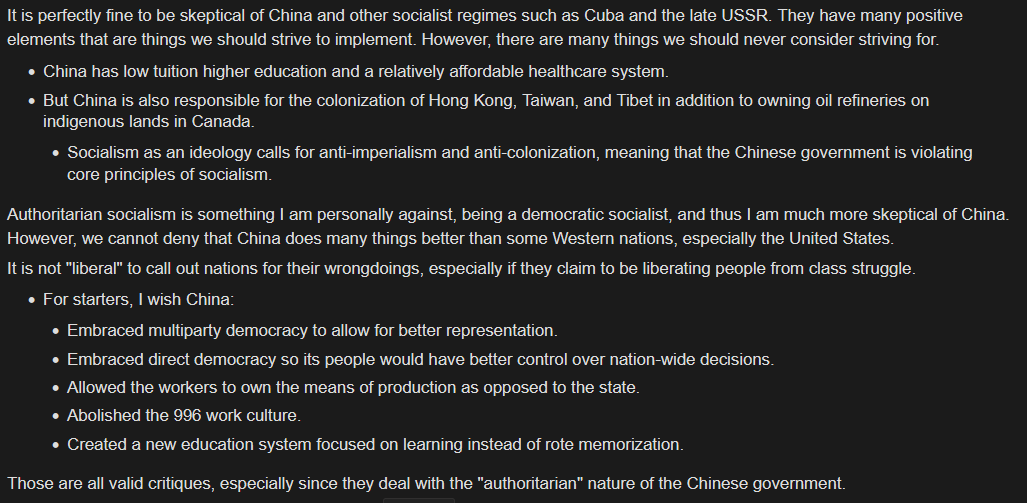(I was a bit pressed writing this and might revisit it later)
I just read this reply to the question “Is it wrong to call China authoritarian or oppressive” on r/socialism_101 and it was so wrong, yet is an opinion so widespread among some “socialists” that I had no choice but to address it. Here is the reply:

Socialists of all kinds must support existing socialism during a cold war such as we are having now. In public, not a single criticism is allowed. Isn’t that too harsh? Liberals will not remember all the good things you graciously conceded about the USSR or China, they will remember that their communist friend also agreed with them (opinions that are created and fed by the mass media). They will say “see? even communists don’t think the communist party is communist!”. Then when the mass media calls for war against China like they did against the USSR, they will not oppose any resistance.
How do you change people’s opinions by presenting them what they already believe in? You will instead just reinforce them. You are not helping socialism, no matter which path you believe in, by going against socialists.
Did China colonise parts of its territory?
First of all, what is colonisation? This is not a rhetorical question. Because of our colonialist past and imperialist present, Europeans and North Americans have some sort of collective guilt over any sort of war or intervention. In this confused mindset, we equate all states together as if they all share the same characteristics (authoritarianism and oppression). But the Chinese state in the PRC is not the same state as the USA or France.
The three territories in question here are Taiwan, Hong Kong, and Tibet.
Hong Kong has always been Chinese and it is absolutely ludicrous and a great mistake to call Hong Kong a colony. It was a colony under the British, and the agreement, proposed by Deng Xiaoping, was that they would keep the system in place for 50 years. This is what won over the British. Even after handing a country back their city, they still wanted their system in it. They still wanted influence over Hong Kong even after “handing it over”. Deng beat them at their own game and he was the one who came up with the 50 years status quo, making the bid that by then China would be in a position to secure their interests over Hong Kong without outside influence. Some comments to the OP mentioned that people in HK don’t consider themselves Chinese, or mainlanders to put it more generally.
It does not matter what they think they consider themselves, I will say that bluntly right now. If we asked everyone in the world what they wanted culturally and politically (and considering we could even get a 100% consensus), they would all identify locally and all would support some form of independence.
People in Hong Kong are etchnically and culturally Chinese. When Westerners talk about colonisation, they think Europeans landing in the Americas. This is our model that we apply any time we hear colonisation: far-away invaders. It’s not entirely wrong; native populations in the Americas had nothing in common with European settlers. But this is not the case in Hong Kong; it literally borders Schenzen.
In Hong Kong, independence was supported by only 25% of the population during the 2019 riots. The rioters were a very small part of the independence or “democracy” (liberal republic model) factions. No socialist should dictate their stance by the clap-o-meter, making more noise does not make someone more legitimate or correct.
It’s in this sense that we can’t say that all independence or minority movements are just. Warlords in 1930s Xinjiang who tried to establish an East Turkestan Sheikdom (yes, literally feudalism), were they justified? Should the ROC have let them do that because it’s what part of the people wanted, and they were vocal about it? Perhaps this pleases anarchists who see there a way to achieve horizontal communes and break down country borders, but it’s not how the capitalist hegemon sees it. They will do to you what the Japanese did to anarchism in Korea: go commune to commune and destroy the tiny amount of resistance it can offer with their armies. It is not a realistic proposition.
Tibet is different. I have no problems saying Tibet was invaded if you don’t want me to say it was liberated. And that invasion was overall a net good. But it was not colonised. That is the nuance libertarian socialists must understand; that because violence has been conducted for fascism or imperialism does not mean violence is inherently, always, 100% a bad thing. Today, Tibetan culture is thriving and the native population is growing. Tibet was a feudal theocracy until the invasion. The liberation was welcomed by the serfs, who saw their contracts destroyed before their eyes. Living in mud houses without central heating is not traditional culture, it’s poverty.
Taiwan is again different. Somehow when it comes to the mystical, far-away land of China (despite the internet being at your fingertips), it’s a monolith and every diplomatic issue the PRC has found itself in is the exact same. The ROC is the one continuing the civil war. Instead of surrendering in 1949, they fled to Taiwan and massacred the native population to enforce their rule over the island. Today, most people in Taiwan (who are ethnically Chinese even if they consider themselves Taiwanese as a way to appeal to the USA) are happy with the status quo, because they do not know what it would mean to be part of the PRC. They are scared that this would destroy their quality of life. But virtually nobody is crying out for Taiwanese independence, this is a fever dream of the mass media.
This is where we deviate very far from less serious analyses. We look at class interests. What were the interests of the Native populations in the USA as they were getting driven out of their lands and massacred? To survive, to have a foothold somewhere, to avoid extinction. What is the interest of Chinese people in Taiwan (natives make 2.5% of the population still)? To cosy up to the USA. The interests are completely different and therefore the same analysis will not apply. Stop looking at Taiwan as the Native Americans and China as the evil European coloniser. They are not foreign to Taiwan and again, it’s the ROC continuing the civil war. The civil war will go on until the ROC is driven out. After that, yes, the PRC has said they consider it a Chinese province. So did the ROC, Qing, Ming. The only times Taiwan has not been Chinese was during WW2 and during Dutch colonisation.
What would the propositions achieve?
The comment also came with propositions that they wish China would do:
- Embraced multiparty democracy to allow for better representation.
- Embraced direct democracy so its people would have better control over nation-wide decisions.
- Allowed the workers to own the means of production as opposed to the state.
- Abolished the 996 work culture.
- Created a new education system focused on learning instead of rote memorization.
What would these propositions achieve, aside from making our liberal sensibilities happy?
The first proposition in fact is the famous cult of failure of our Christian heritage. We root for the underdog, the David versus the Goliath. Minorities in China have been magnanimously given self-determination by foreign “socialists”, but the majority of Chinese people (92% approve of the CPC), because they form the majority, are not allowed a voice. The Chinese people are happy with a single-party system. Who are you to tell them what they should have? Most minorities in China (there are 56 recognized) are happy with the CPC.
Do they need a multiparty system so that they get the same mess as us? So that liberal and right-wing parties can get foreign funding and lobby to be elected, and throw away everything the revolution achieved?
I should point out now the writer of this comment identifies as a democratic socialist, and perhaps that is why they think the Chinese state owns the means of production. China not only has the biggest workers coops in the world (the utopian revolution all libertarian socialists dream of) they have the most of them anywhere, and the state does not control everything. They are thinking of the USSR. In China, it is possible to own private property – this is one of the contradictions any Marxist will recognize. What we don’t recognize is that somehow this makes them not true socialists, when we see time and again that the bourgeoisie is below the state.
Does their current education system not produce capable and skilled workers and researchers? China is now leading in the number of academic papers published. Why do they need to change it, except that you had a bad time in school (I did too)?
What does China mean for us, as communists?
The PRC does not owe us anything. They are allowed to follow their own path and do not need to be funding communist parties abroad if they don’t want to. They are not in a position right now to be leading the worldwide communist movement. They learned from the USSR.
We rarely talk about China with my party because what do they mean for our party? Nothing. We have our own local material conditions and our solutions for them. I do take inspiration from the Chinese model, but we are not there yet.
Moreover, the CPC does not presume they know better than local communist parties and that they are in a position to give us lessons.
I have no problems saying I will allow libertarian socialists and demsocs to dictate things to us MLs when they can show their ideology has achieved anything. We do not want war with anyone. Not with China, not with Iran, not with the USA or the European Union. If you don’t want war, then stop doing the imperialist media’s work for them. Don’t draw the line at solidarity when they are evil tankies.
I really do not understand the obsession with multiparty democracy. Especially from people who have been living in bourgeois dictatorship since they can remember. The whole point seems to be to ruse the masses into believing that they have some agency in determining their political destiny. Meanwhile if any ruling party tries to implement any pro-worker reforms they get collectively sabotaged by the opposition. Maybe multi-party democracy has a place in the post-imperialist world where all parties represent workers but for now that scenario is imaginary.
In terms of criticising China, it is impossible to do so in good faith since the business of “criticizing China” seems to the monopoly of racist liberals. There is no room to take a balanced view when the reality is distorted beyond recognition by the capitalist ideoligical apparatus. I have stopped caring about having an opinion on China because of this reason. Even if China is a capitalist country, it is still a country that the rest of the world should look up to. This is especially true for the third world because China is to some extent the only actuallt developing country and the only way out of the economic chokehold that the western bloc has over the global south.
In terms of criticising China, it is impossible to do so in good faith since the business of “criticizing China” seems to the monopoly of racist liberals.
Even then China moves so fast and does so many things it’s hard to keep up. The CPC is the biggest consumer of polls and audits in the world, for everything they do they conduct polls. Their internal system is based on audits – there’s a governmental agency just tasked with internal audits, and that’s how they promote officials.
If we criticize them on some point, it might have already been fixed by the time we get around to talking about it. They constantly change policies and laws.
Here if a project gets finished in 2 years and the budget only doubles, we consider that efficient. In China they got hospitals up and running in 10 days. But then that seems too far-fetched and so it must obviously be fake. We are used to mediocrity from the bourgeoisie.
I really do not understand the obsession with multiparty democracy.
A multiparty system has been sold as the defining trait of democracy (or at least synonymous with an electoral cycle), election ballots must have little symbols for each little party. But even those who buy into it fall into inevitable contradictions: when, for example, they’re made aware that nations like the PRC and the DPRK have other parties (similar to the post-imperialist scenario you’ve stated), they become quite perplexed; also, all these people would be only satisfied if the party they support won not only the general elections, but also every election in every region/municipality/district/etc, essentially desiring the one-party system they are feverishly against.
These are just brief points on how that obsession falls over itself, I purposely don’t want to get into how the basis for the obsession (be it the electoral cycle, how a multiparty system actually behaves, etc) is a sham on its own.
The role of the party is entirely different in AES and that’s their strength. Here parties just promote factionalism. We have seen time and time again in my and my comrades’ work that people would oppose our project just because they were from capitalist parties and we are the evil commies. How can anyone be against more protection for minor workers? Well, they’ll find a way to be.
Other parties operate in an audit capacity; they can follow sessions and meetings but only offer advice, they don’t have the power to make law. An easy way to put it is that the communist party does not drive the train, it operates the switches to get it to destination. The political process happens with the party, but not always. In Cuba for example all candidates are eligible, they don’t have to be affiliated with any party. The CPC (Cuba) makes sure the process is respected (can’t run yourself, you have to be recommended. You get one page to describe yourself and your qualifications, and can’t make any promises) and remains free of interference (the youth leagues guard the urns for example).
Multiparty democracy is amazing, you get four years to drag your feet and amass as much money as possible for yourself and the party (base salary + attendance fees + lunch stipends + hotel stipends + free insurance + pension + supplies budget + connections + a good spot in an NGO after your term, politics really does pay) and then after your term is up your successor will destroy everything you’ve attempted to build. Really the best model the world has to offer, this is the end of history happening before our eyes.
Fair points, but just because the West has capitalist corruption doesn’t mean it’s going to be the end of history. That seems like something a bitter pro-western doomer would claim. China is doing well for itself and soon the US will be knocked off the top spot economically, which means China and Russia will be able to dictate their terms to the US on international issues. The world will be getting better soon.
EDIT: It seems as if the ‘bitter pro-western doomer’ was Francis Fukuyama, and the post I was responding to may have been a jab at him instead. I couldn’t have known at the time since I don’t follow such figures.
Exactly right!
Crazy how it was just decided that the gold standard for democracy is what they started doing in Britain a few centuries ago
Tibet is different. I have no problems saying Tibet was invaded if you don’t want me to say it was liberated.
IIRC Tibet was part of China in the late Qing dynasty at the beginning of the 20th century. After nearly 40 years of world wars, civil war, and fascist occupation, it fell to Mao to put the country back together again. Tibet was part of that.
harsh but very fair
From the way some self-proclaimed socialists talk, you’d think they were getting hyped for a war with China. I sincerely hope they do not want it.
Self-determination is a very difficult term to define, I rarely hear Marxists talk about it. I don’t think it has a marxist definition. The far-right party here used self-determination to oppose EU laws. We are clearly not talking about the same kind of self-determination. To me, first and foremost, self-determination means no outside influence – this is also dialectical; dialectical change is self-propelled.
I was recently abroad and met comrades from their national party. They had lost some ground to far-right parties and I asked them what they did that worked, as I was wary about facing the same issue myself. The first thing he told me was they do not want to tell other parties how to behave. He was absolutely right (though I was also interested in just having the ideas and seeing how we could fit them in for our country). Just as it’s not China’s place to tell us how to conduct the revolution, it’s not our place to tell them how to run their country.
I back just wars. Mao talked about just and unjust wars, and even Dr. King talked about just and unjust laws. Progressive wars get us closer to communism and are just. Other wars will be reactionary and drive us away from socialism. The war the CPC waged on the ROC was just. But they have to come from within, i.e. self-propelled. Foreign influence to push one faction to war is destabilising. This also answers, I hope, the liberals that sometimes ask why we let communists do everything but get up in arms if capitalists do the same thing. Communist parties are progressive and bring us towards communism. If I didn’t believe in communism, I wouldn’t be one. So of course I will support communists waging a civil war and denounce the national bourgeoisie waging theirs.
I don’t want a war with China, the USA, Iran; a war in Europe, in South America, or any other war that is not progressive. I don’t want millions of people to die for pointless capitalist interests. I don’t want the quality of life to go down irreparably for decades. I don’t want wanton destruction of infrastructure. I sincerely hope anti-China socialists want that as well, because sometimes I ask myself the question. That’s why I’m harsh with them (and also that they speak with authority despite never producing any results, and call anyone a tankie when they start getting successful).
Agreed 1000%





